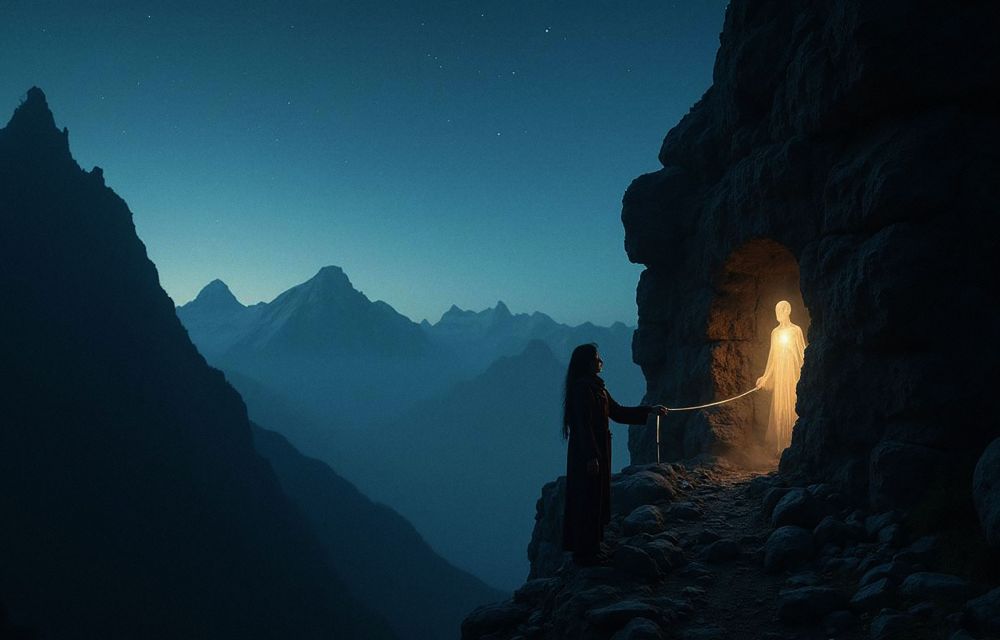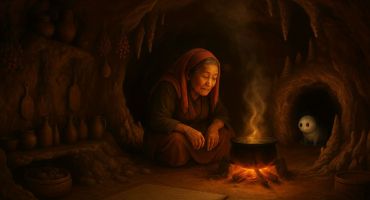A long time ago, before clans were formed, people lived in the mountains. Life was simple, and the villagers relied on nature for everything. Above their village stood a great rock cliff, where, they said, a mysterious being lived. Some called him a Deuta (Deity), while others whispered that he was a Pret (Ghost).
At night, this being would leave the cliff and visit a young girl in the village. No one knew of these visits until one day, the girl discovered she was going to have a child. Frightened and unsure, she confessed to her parents.
“A deity visits me at night,” she said softly, her eyes lowered in shame. “I carry his child.”
Her father frowned deeply. “A deity or a ghost, no one should come and leave without showing his face! We will find out who this is,” he said firmly.
The mother nodded. “Next time he visits, tie this thread around his thumb,” she said, handing her daughter a long piece of string. “It will lead us to him.”
That night, the girl waited anxiously. When the being arrived, she tied the thread around his thumb while he wasn’t paying attention. Before dawn, the being left as usual, unaware of the trap.
“Pull the string, daughter!” her father whispered the next morning.
The girl followed the string, which stretched all the way to a water source (muhan) at the foot of the rock cliff. As she tugged harder, a cry echoed from deep within the rock.
“Aya! Aya! Stop pulling!”
The family now knew where the being lived. The father marched to the cliff and shouted, “Show yourself! You visit my daughter, yet you hide from us? Come out and face me!”
A deep voice came from within the rock. “I cannot leave my dwelling,” the being said. “What do you want from me?”
“You will marry my daughter and take responsibility for your child!” the father demanded.
“I cannot marry her,” replied the voice. “I am a god, bound to this rock. But I will offer you something else. Name your wish, and it shall be granted.”
The family discussed for a long time. Finally, the father said, “Teach us the secrets of farming. Give us tools and knowledge, so we can work the land and feed our people.”
“So be it,” said the voice.
The next morning, the family found gifts waiting at the rock’s base—a yoke, oxen, and all kinds of vessels and utensils, water jars, plates, and cups. From that day, they became the first to know the art of sowing, ploughing, and harvesting.
As time passed, the girl gave birth to a boy. Her father named him Deupahari Gharti—“The Landless Son of the Rock.” The name reminded everyone of his unusual birth.
When the boy grew up, he married a girl from a nearby settlement. But since he had no land, he and his family left the village. Crossing the hills, they came to the vast plains.
“Look at this soil,” said Deupahari to his wife. “It is rich. Here, we will grow crops and make a life.”
And so, with the tools given by the god, he tilled the land, turning the plains into fertile fields.
Hearing of this success, people from other clans came. They were amazed by Deupahari’s skills.
“How do you plough the land so well?” they asked.
Deupahari smiled. “A deity taught my family the secrets of farming. I can teach you too.”
Grateful, the other clans agreed that Deupahari’s family—the Gharti—should always perform the first tilling of the fields each year.
“It is your right,” they said. “If anyone else begins, the gods may become angry and bring drought.”
And so, Deupahari and his descendants were honored as the first farmers, linked forever to the deity of the rock cliff and the watersource.
Even today, the Gharti clan is remembered as the keepers of this sacred legacy, the ones who brought the gift of agriculture to their people.





